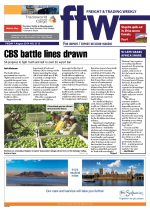The South African
government has vowed to
“fight tooth and nail” to avert
a possible European Union
(EU) ban on citrus imports
from the country, according
to trade and industry minister
Rob Davies – a move that has
been welcomed by the Citrus
Growers’ Association (CGA) of
Southern Africa.
“Support from the
department of trade and
industry (dti) in sorting out the
dispute regarding the actual
risk of citrus black spot (CBS)
is essential as a longer-term
solution. We cannot continue
to have additional measures
imposed every year. Eventually
the costs and disruptions will
result in an unviable market,”
said CGA chief executive,
Justin Chadwick.
This after a consignment
of lemons with CBS was
intercepted at the Port of
Rotterdam earlier this month,
prompting the EU to call on
South Africa to tighten up
its risk management system
as the interception seems to
indicate to the EU that the
system failed in this particular
case.
Dutch authorities for plant
health issued a notification
of phyto-sanitary noncompliance
after intercepting
the consignment which means
that citrus imports from South
Africa are now on a trade
watch list at EU borders. The
threat of a ban is now a step
closer as the EU has decided
that if more than a certain
amount of contaminated
exports are found, South
African citrus fruit will be
locked out of the economic
zone. According to the dti, in
2013 about 70% of oranges
sold in Europe came from
South Africa.
At a media briefing last
week, Davies said that SA
would use “whatever tools it
had” to defend its interests. He
noted that Europe’s reluctance
to compromise on the CBS
issue could be devastating
for the R8-billion local citrus
industry.
Department of agriculture,
forestry and fisheries (Daff)
chief director: stakeholder
relations and communications,
Makenosi Maroo, told FTW
that South Africa had gone to
“great lengths and expense”
to ensure compliance and that
other fruit types in the export
line from the farm whose
consignment was intercepted
had been identified and would
be “dealt with accordingly”.
“An investigation has
been launched by Daff
in collaboration with the
industry to determine the
possible
causes for the
presence of
CBS. Based on
the findings,
remedial
measures
will be
implemented
as
appropriate,”
she said.
Maroo also
noted that
additional risk measures had
been introduced, effective last
week Thursday (July 24), that
included pre-export sampling
and inspection requirements.
Furthermore all Valencia
oranges to be exported must
be subjected to a chemical
symptom expression test.
Chadwick said that CGA
was awaiting a report from
its own representative
who last week visited
the farm from which the
consignment originated. The
representative
was
accompanied
by Daff and
Perishable
Products
Export
Control Board
(PPECB)
officials.
Meanwhile,
the producer
of the
contaminated fruit has been
deregistered as an exporter
and will remain so until he
can prove – via an expert
report – that he has taken
appropriate steps to ensure
the problem with the risk
management system has been
rectified, said Chadwick.
CAPTION
Citrus black spot on a South African Eureka lemon.
Workers on a Sundays Organic Growers' Association (Soga) citrus farm in the Sundays Valley,
Eastern Cape. Photo: Soga
INSERT & CAPTION
Eventually the costs
and disruptions will
result in an unviable
market.
– Justin Chadwick

